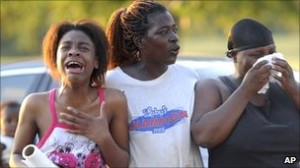Why don’t black Americans swim?
Posted April 11th, 2012 by James DeWolf PerryCategory: Living consequences Tags: Racial discrimination, Segregation, Swimming
 James DeWolf Perry is the Tracing Center’s executive director. This entry is cross-posted from James’ own blog, The Living Consequences, and the opinions expressed are his own.
James DeWolf Perry is the Tracing Center’s executive director. This entry is cross-posted from James’ own blog, The Living Consequences, and the opinions expressed are his own.
Why don’t black Americans swim?
This is the provocative headline of a BBC News story, and it would be easy to misinterpret the BBC’s meaning. This is, after all, a sweeping generalization, and one which has been a racial stereotype in the United States for many generations.
However, the BBC reporter cites credible statistics to support the widely-held belief that swimming is, in fact, nowhere near as common among black Americans as it is among white Americans.
More importantly, the article argues that this situation arises out of the nation’s painful legacy of slavery and race and has deadly consequences.
According to the BBC, accidental drownings take 3,500 lives in the United States each year, and the drowning rate for black children is three times that of white children.
Relatively few black children can swim
The cause, this story suggests, is that relatively few black children learn to swim. In an incident in Shreveport, Louisiana in 2010, six black teenagers drowned when they went to help another teenager in trouble in the Red River. None of the teenagers could swim, and neither could any of the adults present with them.
In a study conducted by sociologist Carol Irwin, 70% of black children in the U.S. report having no ability to swim, or only enough to splash around in shallow water. Another 12% are self-taught.
Irwin reports that this is a vicious cycle, with many black parents unable to swim and therefore unable, or unwilling, to teach their children. The major cause, Irwin says, is that black parents who cannot swim will not let their children learn to swim because they are afraid their children would drown.
Ironically, this fear that children will drown seems to be what is causing more black children to drown.
The historical legacy
Historian Jeff Wiltse, author of Contested Waters: A Social History of Swimming Pools in America, argues that this situation is largely the result of historical discrimination against African Americans.
The social history of swimming in the United States, according to Wiltse, took off in the 1920 and 1930s, when recreational swimming first entered mainstream culture and thousands of community swimming pools were built across the country. Black Americans were generally banned from using those municipal facilities, and as this discrimination ended, in the 1940s and 1950s in the northern U.S. and later in the southern states, white families often shifted to private facilities and public swimming pools were systematically neglected.
When swimming pools finally started being built in black neighborhoods, after the 1960s, they were generally small, shallow pools that accommodated playful splashing, but were not designed for swimming.
The result, Wiltse says, of the historic exclusion of black families from swimming is that swimming is not generally a part of the experience of black families and institutions, and tends to be viewed with skepticism. Irwin would add that swimming, being unfamiliar, also tends to be viewed in the black community with fear, which in turn often results in danger when black children are exposed to swimming, as they often eventually are.
Swimming is, therefore, yet another example of the myriad ways in which historic discrimination is not simply in the past, but had left a legacy of living consequences today.



Leave a Reply